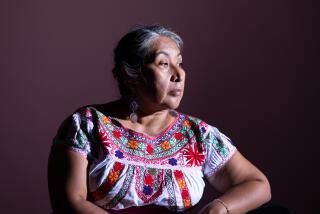A Mother’s Education Began With Her Children’s : GERALDINE ZAPATA
I’ve lived most of my life in California and East Los Angeles and have worked most of my life in East L.A. I came here when I was in the seventh grade. Before that, I lived in Cheyenne, Wyo., where I was born on the Indian reservation where my mother was born. I kind of consider that Mexicans are Indians, and so it’s never been a conflict with me in terms of “Am I Indian or am I Mexican?” I consider that basically I am an indigenous person from this continent and that’s where my history is.
Although I had wanted to go to college, I did the traditional thing for women my age. My father, at one point, said I didn’t need to go to college, that I could get a job and then get married.
So I did.
I got a job and then I got married and I never went to college directly from high school, although I did go later. I married somebody who also went to Roosevelt (High School), got married in St. Mary’s Church, had a typical wedding and had four children by the time I was 27.
I was a homemaker and I did my washing on Monday and ironing on Tuesday and cleaning house on Friday and taking the kids to school.
And then there came a major turning point in my life. I read an article in the newspaper about a cooperative nursery school that was multicultural and they had pictures of the children. The article was really interesting and I discovered that that co-op nursery school was in my neighborhood and so I went over there. There was a lot of parent education that took place and the head teacher took me under her wing for some reason, and would almost force me into the leadership positions which I felt really shy about.
So I began to get involved with the school and as I got real involved in the school, my husband was threatened. He worked for the post office. We were the middle class, a striving young family doing all the things that were expected of you traditionally, and this was not traditional for him. I enjoyed being involved with my kids, but it created conflict. The conflict accelerated over quite a few years and eventually we were divorced.
When my children were going to school in East L.A., I found I didn’t like the educational system. So I got involved with a group of people that was fighting for educational reform, for bilingual teachers and so on. I really believe that we all have a responsibility to pull each other along and to open up doors and to create and encourage younger people to believe in themselves and to go back to school.
Personally, I guess I began to have an avenue or vehicle for actualizing some of my personal beliefs of social justice and injustice being experienced by my children in the school system and by our community. I saw a lot of prejudice and racism and I began to be aware of it and the civil rights struggles going on, which at that time was seen mainly as a black-white civil rights struggle, though we as Latinos were in our own way fighting for justice and civil rights.
In my 25 years in actually working in various programs and being a part of community development, I have seen how we have been able to develop as a community. Since 1975, I’ve had to go out and raise the consciousness level about child abuse in our community. With child abuse, we’re not just looking at a child that’s been injured, we’re looking at the family. I think we’re partially where we are today because the focus has not been on young people.
The most significant part of my life is my children. I look at what they’re doing today--one daughter is a licensed clinical social worker, the other is working at UCLA in a leadership program funded by the Ford Foundation, one son is preparing for the state optometry exam and the other is an elevator mechanic--and think about when they were young, when they were growing up. I think that every mother will say, “Gee, I should have done this differently, or I should have done that.”
But when my children were small, for me, the goal was very simple and maybe too simplistic: It was that they grow up to be good people. I can say that that goal has been accomplished.
More to Read
Sign up for Essential California
The most important California stories and recommendations in your inbox every morning.
You may occasionally receive promotional content from the Los Angeles Times.










